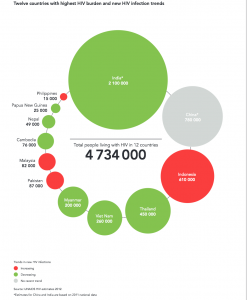Indonesia, the country with the largest Muslim population in the world, is not an advocate for teaching formal sexual education in schools. Instead, sex education is integrated into biology, social studies and religious classes in an implicit manner, including teachings on abstinence. There is an ongoing debate about the correct way to combat the spread of HIV and sexually transmitted diseases (STDs), as well as preventing unplanned pregnancies, with disagreements generally taking place between the government and non-governmental organizations, religious leaders and sexual health experts. The question is, what effects are the decisions of today’s adults going to have on the children of tomorrow if they are not equipped with the proper information they need about sex?
According to a survey in 2011 by the Ministry of Health, only 20 percent of Indonesians aged 15 to 24 had comprehensive knowledge of HIV. This, coupled with information from UNAIDS that Indonesia is one of Asia’s fastest-growing HIV and AIDS epidemics, shows the urgent need to ramp up education about sex in the country. Indonesia’s first case of the HIV virus was reported in 1987 and in 2012, 610,000 were estimated to be living with the virus according to UNAIDS HIV.
In Surabaya, instead of pushing a sex education agenda, recent news saw Mayor of Surabaya, Tri Rismaharini—through the Department of Trade and industry—forbidding the sale of contraceptives in minimarts and supermarkets to unmarried individuals and under-21s. The move was made in an effort to “protect children as the future generations, as well as minimize the negative effects of the misuse of contraceptives,” said head of the Department of Trade and Industry of Surabaya, Widodo Suryantoro, to Kompas.
Dewi Candraningrum is Chief Editor of Jurnal Perempuan, a publication aiming to educate and train readers of gender equality, opposing any forms of violence against women. Candraningrum believes that banning the sale of condoms to unmarried individuals in Surabaya is a bad sign. “This could lead to many unsafe abortions and unwanted pregnancies, which at the end endangers the lives of women,” she said. “Regulations are not clear in Indonesia. Sometimes they promote [the use of condoms], sometimes not; everything is so arbitrary if related to sexuality,” she continued.
In January, East Java’s city of Jember announced a plan to carry out virginity testing to high school girls, not allowing them to graduate if they failed the test. The plan sparked widespread condemnation, especially among human rights and women’s rights groups, including Jurnal Perempuan. Indonesian officials have recently apologised over said proposal, after top Islamic clerical body, the Ulema Council, announced the tests were not compatible with Islam. The city council of Jember apologized for any offence caused to women and Indonesian students.
How can such proposals to combat the spread of disease and unplanned pregnancies be put forward in the first place, and could they be linked with the general lack of sexual health education in the country? Vidia Darmawi is an independent consultant for the evaluation and review of HIV programmes, having worked with Family Health International and AusAID on HIV projects in 2002-2010. She thinks “it is not because of low-educated local authorities; it’s just that we don’t have an enabling environment or support from the government.”
Sex education in Indonesia is considered a taboo and Candraningrum says that teaching it “is considered harming the life of girls.” The government and education institutions view sex education as promoting ‘free sex’, a term coined by conservatives in an effort to ban sexual education, which Candraningrum believes should be changed to ‘safe and responsible sex’.
In 2012, former Education Minister Muhammad Nuh said he objected to sex education being taught in Indonesia’s secondary schools, stating that children don’t need formal education about sex because they will learn it “naturally”.
In the same year, the newly appointed Health Minister Nafsiah Mboi declared that the Education and Cultural Ministry should address the spread of HIV/AIDS by providing proper education for schoolchildren. Nafsiah, a Catholic, added that she would promote condom-use to youngsters, which resulted in backlash rallies by Muslim groups considering the move an act of promoting indecency among the country’s youth. Consequently, several weeks later, Nafsiah withdrew her plan of kondomisasi (distributing free condoms), reported to have said: “With confidence, I do not agree with the distribution of condoms to our young people, absolutely not.”
Several countries in Asia have documented large reductions in common STDs through successful condom programmes. In a World Health Organisation (WHO) report, Thailand measured a 95% drop in common curable STDs during the 1990s, following introduction of the 100% condom-use programme, implemented by STD clinic staff working with sex trade establishments – in Indonesia we see 40-50 percent condom-use at best. Cambodia measured large decreases in STDs over five years following a similar intervention.
Namibia, a country that once had one of the highest rates of HIV, took aggressive action to reduce the spread of the virus. In a five-year plan (2010/11-2015/16), in conjunction with the US government, life skills-based HIV prevention is being taught at secondary schools, more than 25 million condoms are distributed every year to the public sector, and over 60% of men and women aged 15-24 have advanced knowledge of HIV, compared to Indonesia’s 20%, mentioned earlier. Sex before the age of 15 has also dropped in Namibia, as has the percentage of people reporting multiple partners. Could Indonesia take a leaf out of Namibia’s book?
In 2013, Terence H. Hull—Emeritus Professor at the Australian National University—along with Iwu Dwisetyani Utomo, Peter McDonald, Anna Reimondos and Ariane Utomo produced a report titled Sex Education: Do primary students understand how pregnancy can occur? A comparison of students in Jakarta, West Java, West Nusa Tenggara and South Sulawesi, Indonesia, to understand Indonesian students’ understanding of conception. The study covered students from a wide variety of backgrounds in four different regions of Indonesia with contrasting economic, geographic and sociocultural and population characteristics. 1,762 grade 6 students (11 to 12-year-olds) provided answers to the following list of behaviours and processes, indicating whether they believed each behaviour or process could lead to pregnancy:
1) When a man and a woman kiss 2) When a man and a woman hug 3) When a man and a woman have sex 4) When the sperm comes into contact with the egg.
Just over half of the students showed an advanced understanding of conception, correctly identifying that hugging and kissing do not lead to pregnancy and that sexual intercourse and the sperm coming into contact with the egg does. An additional 16% of the students had a purely biological understanding of pregnancy, and the remaining third were categorized as ‘other’, indicating a poor understanding of conception. Students in general schools and those in top-rated schools were more likely to have an advanced understanding of the causes of pregnancy than students in Islamic religious schools and schools with average performance. Location also had a significant effect on the understanding of conception, with West Nusa Tenggara and South Sulawesi showing particularly lower odds in comparison with Jakarta.
Studies in the West have proven that children have the intellectual capacity to understand the process of sex and reproduction by the end of primary school, and children as young as six are able to understand the fundamentals of how conception occurs.
Hull and co. observed “the obstacle to providing children with comprehensive sex education thus has less to do with the children’s ability to understand than it does with the strong apprehension of parents, teachers and policy-makers, to discuss sex with children…”
What happens when children are not provided with accurate information at an early enough age? They are most likely to turn to other sources, for instance their friends, the media and the ever-available Internet. Due to the quality of information available from these sources, adolescents are increasingly at risk of practicing unsafe sex.
Much effort is needed to overcome challenges provided by Indonesia’s current decentralized school system. Due to decentralisation, even current topics such as HIV and AIDS, which are included in the minimum standards for the national curriculum, do not always reach the district or school levels and are not always adhered to by textbook publishers, as reported by UNESCO (2010). Teachers are often found to shy away from talking candidly about sex to pupils, due to the sensitive nature of the topic, and teacher training must be implemented. Darmawi would like to see the education ministry “equip selected teachers with good materials and skills on how to convey [the message]” adding that “parents should also be involved in pre and post [class] discussions on sex education.”
Darmawi says, “In general, we’re really making progress in Indonesia compared to 10 years ago. HIV services can be accessed widely, information on safe sex can be more easily found in hotels (in red light areas), shops and posyandu (children and pregnant women clinic).” Hull and co.’s report concludes, “In the interim… for individual schools or districts, the local content curriculum provides some opportunities for including reproductive health material.” When asked whether any progress has been made since his report in 2013, Hull responded: “No improvement is likely.”




